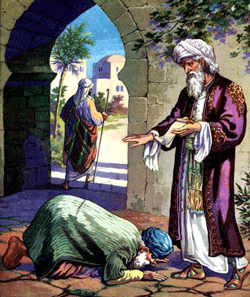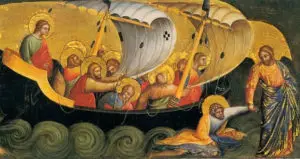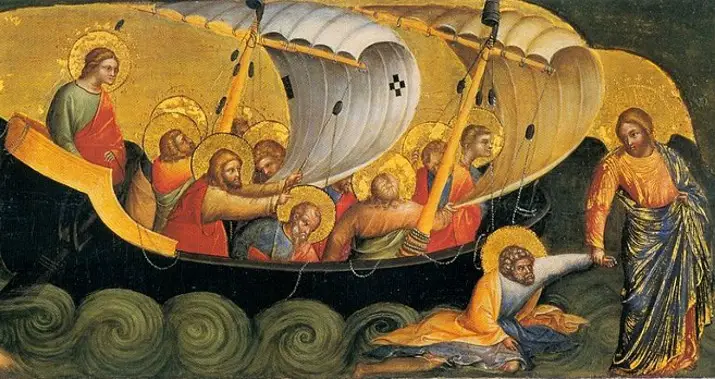After Jesus fed the 5,000, he sent the crowd away and made the disciples get in the boat and go ahead of him to Bethsaida,[1] located on the other side of the Sea of Galilee. Jesus then went up on the mountain to pray.
A storm arose on the sea, and the boat carrying the disciples was being battered by the wind and waves. Sometime during the fourth watch,[2] Jesus came to them walking on the water:
Matthew 14:26-33 (NASB) When the disciples saw Him walking on the sea, they were terrified, and said, “It is a ghost!” And they cried out in fear. 27 But immediately Jesus spoke to them, saying, “Take courage, it is I; do not be afraid.” 28 Peter said to Him, “Lord, if it is You, command me to come to You on the water.” 29 And He said, “Come!” And Peter got out of the boat, and walked on the water and came toward Jesus. 30 But seeing the wind, he became frightened, and beginning to sink, he cried out, “Lord, save me!” 31 Immediately Jesus stretched out His hand and took hold of him, and *said to him, “You of little faith, why did you doubt?” 32 When they got into the boat, the wind stopped. 33 And those who were in the boat worshiped Him, saying, “You are certainly God’s Son!” (emphasis added)

Some Christians claim that the disciples’ worship of Jesus is proof that he is God. They reason that since only God can rightfully receive worship, Jesus must be God. That Jesus was worshiped is beyond dispute. But before drawing any conclusions as to Jesus’ supposed divinity, we must answer two questions: What did the word worship mean in the first century, and what does the text reveal about why they worshiped Jesus?
Proskuneô
The word worshiped in verse 33 is the Greek word proskuneô, which comes from the words prós, which means toward, and kyneo, which means to kiss or adore. According to The Complete Word Study Dictionary, proskuneô means:
To worship, do obeisance, show respect, fall or prostrate before. Literally, to kiss toward someone, to throw a kiss in a token of respect or homage. The ancient oriental (especially Persian) mode of salutation between persons of equal ranks was to kiss each other on the lips; when the difference of rank was slight, they kissed each other on the cheek; when one was much inferior, he fell upon his knees and touched his forward to the ground or prostrated himself, throwing kisses at the same time toward the superior. It is this latter mode of salutation that the Greek writers express by proskuneo. In the NT, generally, to do reverence or homage to someone, usually by kneeling or prostrating oneself before him.[3]
One of the main misconceptions regarding worship is that it is an act that is reserved for God alone. While God alone is to be revered as God, by definition, anyone can receive proskuneô or worship because it is an act designed to show reverence for or to pay homage to anyone viewed as being superior. Scripture records instances where worship is offered to people other than God.[4] For example, Jesus promised believers in Philadelphia who had been faithful to him, that he would make those who were of the synagogue of Satan worship before them:
Revelation 3:9 (KJV) Behold, I will make them of the synagogue of Satan, which say they are Jews, and are not, but do lie; behold, I will make them to come and worship before thy feet, and to know that I have loved thee. (emphasis added)
The word worship here in Greek is proskuneô. Clearly, offering worship or proskuneô is not an act that is reserved for God alone because Jesus said he would command it to be offered to faithful believers.
Another example is found in Jesus’ parable about a king who wanted to settle an account with one of his servants who owed him ten thousand talents. When the servant was brought before his master, he fell down and worshiped him:
Matthew 18:26 (KJV) The servant therefore fell down and worshiped him, saying, Lord, have patience with me, and I will pay thee all. 27 Then the lord of that servant was moved with compassion, and loosed him, and forgave him the debt. (emphasis added)

Again, worshiped here is proskuneô, the same word used to describe what the disciples offered Jesus in the boat on the calmed waters of the Sea of Galilee. Surely, we would agree that the servant worshiped the king as his superior and someone who was worthy of reverence and honor but not as God. This is how the disciples worshiped Jesus, as we shall soon see.
Unfortunately, modern translators deviate from the traditional way of translating proskuneô, as seen in the King James Version, when it refers to men. Instead, of rendering it as worship they choose to translate it as bow down or some other similar phrasing. The distinction, which the various texts do not make, reveals the translators’ bias because it is used to support the post-Biblical view that Jesus is God. One astute author addresses the divergence this way:
When the King James Bible was written, “worship” could be used to describe both exhibiting reverence for God and prostrating oneself. While not perfect, it’s a decent translation [of proskuneô]. As a result, throughout the King James Bible, people “worship” many things. A slave worships his owner, the assembled of Satan worship an angel, and Roman soldiers mocking Jesus worship him. In each of these instances, the word does not mean “praise God’s glory” or anything like that; instead, it means to bow or prostrate oneself. But English Bibles adopted later—the New International Bible, the New American Standard Bible, the Living Bible and so on—dropped the word worship when it referenced anyone other than God or Jesus. And so each time προσκυνέω [proskuneô] appeared in the Greek manuscript regarding Jesus, in these newer Bibles he is worshipped, but when applied to someone else, the exact same word is translated as “bow” or something similar. By translating the same word different ways, these modern Bibles are adding a bit of linguistic support to the idea that the people who knew Jesus understood him to be God. In other words, with a little translational trickery, a fundamental tenet of Christianity—that Jesus is God—was reinforced in the Bible, even in places where it directly contradicts the rest of the verse.[5] (emphasis added)
Hence the confusion with this passage and others such as Matthew 2 and John 9. When Jesus is given proskuneô it is often translated as worship, but when the same act is directed towards other men it is translated as bow down to give the impression that only Jesus is being worshiped, therefore he must be God. The key to translating proskuneô properly, however, is to determine the reason for which worship is given.
Why Did the Disciples Worship Jesus?
We do not have to go far to discover the disciples’ reason for worshiping Jesus:
Matthew 14:33 (NASB) And those who were in the boat worshiped Him, saying, “You are certainly God’s Son!” (emphasis added)
The text plainly states the disciples offered Jesus worship because they understood him to be God’s Son or the Son of God as it is most often translated.[6] It is important to note that they did not say You are certainly God, or You are certainly God the Son, but that You are certainly the Son of God.

Unfortunately, many Christians equate the title Son of God with the title God the Son, a phrase that does not appear anywhere in Scripture. Although current tradition fuses the terms, it is important to understand that this was not always the case. Theology professor and author Douglas McCready writes:
While some have used the title Son of God to denote Jesus’ deity, neither the Judaism nor the paganism of Jesus’ day understood the title in this way. Neither did the early church.[7]
Son of God
What then does Son of God mean? Scripture refers to created beings who serve God as being sons of God. Adam, the first human, was called the son of God.[8] Kings, angels, the nation of Israel, and believers are also referred to in this way.[9] But when used of Jesus, the title takes on a Messianic meaning.
John 1:47-51 (NASB) Jesus saw Nathanael coming to Him, and *said of him, “Behold, an Israelite indeed, in whom there is no deceit!” 48 Nathanael *said to Him, “How do You know me?” Jesus answered and said to him, “Before Philip called you, when you were under the fig tree, I saw you.” 49 Nathanael answered Him, “Rabbi, You are the Son of God; You are the King of Israel.” (emphasis added)
Here, the titles Son of God and King of Israel are used synonymously in what is known as a “synonymous parallelism,” a common literary device used in Scripture. It “involves the repetition in the second part of what has already been expressed in the first, while simply varying the words.”[10]
You are the Son of God [first part]
You are the King of Israel [first part repeated using different words]
Thus, the title Son of God, when used of Jesus, is another way of saying Messiah. It offers no connection to Jesus’ supposed deity whatsoever.
Other passages confirm the meaning of Son of God. For example, Peter’s confession regarding Jesus’ identity gives us insight into the meaning of the title:
Matthew 16:13-20 (NASB) Now when Jesus came into the district of Caesarea Philippi, He was asking His disciples, “Who do people say that the Son of Man is?” 14 And they said, “Some say John the Baptist; and others, Elijah; but still others, Jeremiah, or one of the prophets.” 15 He *said to them, “But who do you say that I am?” 16 Simon Peter answered, “You are the Christ, the Son of the living God.” 17 And Jesus said to him, “Blessed are you, Simon Barjona, because flesh and blood did not reveal this to you, but My Father who is in heaven…20 Then He [Jesus] warned the disciples that they should tell no one that He was the Christ. (emphasis added)
In direct response to the question regarding Jesus’ identity, Son of the living God is used synonymously with Christ (i.e. the Messiah). This revelation came directly from God the Father. Again, there is no mention of or connection to a divine title.

The final example that we will look at is from Jesus’ trial before the Sanhedrin. The high priest questioned Jesus as to his identity:
Matthew 26:62-66 (NASB) 62 The high priest stood up and said to Him, “Do You not answer? What is it that these men are testifying against You?” 63 But Jesus kept silent. And the high priest said to Him, “I adjure You by the living God, that You tell us whether You are the Christ, the Son of God.” (emphasis added)
Once more, we see that the title Son of God is synonymous with the Christ.
Jesus Walked on Water
Some may counter that Jesus’ ability to walk on water is proof that he is God. However, if water-walking is a mark of deity, then Peter meets the criteria as well. But Peter himself said on the Day of Pentecost, that instead of the miraculous feat proving Jesus is God, it proved that God was with the man from Nazareth, working miracles, signs, and wonders through him:[11]
Acts 2:22 (NASB) “Men of Israel, listen to these words: Jesus the Nazarene, a man attested to you by God with miracles and wonders and signs which God performed through Him in your midst, just as you yourselves know— (emphasis added)
To be sure, eye witnesses of Jesus’ miracles understood they were evidence, not that he was God, but that God was with him:
John 3:1-2 (NASB) Now there was a man of the Pharisees, named Nicodemus, a ruler of the Jews; 2 this man came to Jesus by night and said to Him, “Rabbi, we know that You have come from God as a teacher; for no one can do these signs that You do unless God is with him.” (emphasis added)
Worship the Father
In Jesus’ famous teaching on worship in John 4, he clearly identified for the woman at the well who it was that should receive worship for being God:
John 4:19-26 (NASB) The woman *said to Him, “Sir, I perceive that You are a prophet. 20 “Our fathers worshiped in this mountain, and you people say that in Jerusalem is the place where men ought to worship.” Jesus *said to her, “Woman, believe Me, an hour is coming when neither in this mountain nor in Jerusalem will you worship the Father. 22 “You worship what you do not know; we worship what we know, for salvation is from the Jews. 23 “But an hour is coming, and now is, when the true worshipers will worship the Father in spirit and truth; for such people the Father seeks to be His worshipers. 24 “God is spirit, and those who worship Him must worship in spirit and truth.” 25 The woman *said to Him, “I know that Messiah is coming (He who is called Christ); when that One comes, He will declare all things to us.” 26 Jesus *said to her, “I who speak to you am He.” (emphasis added)
Here Jesus identifies God, who is the Father, as the one who is to receive worship. Jesus identifies himself as the Christ, the Messiah. Neither he nor the Holy Spirit is included in his instruction regarding the worship of God.
Conclusion
If the disciples’ worship of Jesus is proof that he is God, it is more than curious that this would-be monumental declaration is omitted completely from Mark and John’s accounts of the miracles that occurred on the Sea of Galilee that day.[12] Even more strange is the fact that the incident itself is excluded from the gospel of Luke entirely.
After examining the meaning of the word worship and the context in which it is given, we learned that the disciples interpreted the miraculous events on the Sea of Galilee as proof, not that Jesus was God, but that he was the Son of God, a title synonymous with that of Messiah. For this reason, they worshiped him as one who was worthy of reverence and honor because, as the promised king of Israel, he was their superior.
Matthew 14:33 (ESV) And those in the boat worshiped him, saying, “Truly you are the Son of God.”
[2] Between 3:00 and 6:00 AM.
[3] The Complete Word Dictionary, New Testament, Spiros Zodhiates, ed., (Chattanooga, TN: AMG Publishers, 1993), p. 1233-34.
[4] This holds true for the Old Testament as well. In addition to God, people received shāḥâ or shachah, the Hebrew equivalent of proskuneô, as well. For example, see KJV 1 Chronicles 29:20 where God and the king are both worshiped.
[5] Kurt Eichenwald, The Bible: Its So Misunderstood It’s a Sin, 12-23-14, accessed 1-19-21, http://www.newsweek.com/2015/01/02/thats-not-what-bible-says-294018.html
[6] ESV, NIV, NKJV, KJV, ASV, NLT, Holman Christian Standard Bible, Wesley, etc. translate the text as Son of God. https://biblehub.com/matthew/14-33.htm
[7] Douglas McCready, He Came Down From Heaven, (Downers Grove, IL: InterVarsity Press, 2005), p. 56
[9] 1 Chronicles 17:11-14; Psalm 2:6-7; Genesis 6:1-2; Job 1:6; 2:1; Hosea 11:1-7; John 1:12; Matthew 5:9; Galatians 3:26, etc.
[10] “Ketuvim,” Encyclopaedia Britannica, accessed 04-17-19, https://www.britannica.com/topic/biblical-literature/The-Ketuvim#ref1096330
[11] See also Acts 4:30; 10:38; John 14:10; 17:4.
[12] Mark 6:45-52; John 6:15-21.





Hallelujah! The bible tells us basically who Jesus is and his relationship to God the Father. Many christians, following tradition choose to ignore it or idolized Jesus as God . Jesus is The Son, the Messiah but not the Father.
Hallelujah, indeed!
Can we say to worship one means to revere , recognize, to reckon for the action/ work and one could be any person?
Hi KT,
Yes, that would be an appropriate use of the NT word worship (proskuneo in the Greek). You might also find the article titled, Why Did the Man Born Blind Worship Jesus?, helpful.
Thanks for reading and commenting,
OGW
So I agree with you. But it also says, the “…Word was God.” I agree with your statement, but it’s definitely contradictory to tradition.
But my important question is do you think believing in the Trinity is damnable? I don’t know, but I hope not.
Because I still believe, somewhat, but there are verses like 1 Timothy 4:, the “Spirit expressly says”. But Also, Paul never says (Greetings and Peace from the Father God in Christ Jesus by His Spirit), no, Paul does make a distinction, In all or most of his letters; Greetings and Peace from God, and the Lord Jesus Christ). But then again, Jesus does call the Holy Spirit a He.
And it’s not right to condemn people only warn/correct them. If you would like to contact me you can on Twitter @LetJesusGuideUs, I’d prefer that, but if it’s not too much work. Or Email me. Thank you, & God bless, let’s let Jesus guide us into all truth!
Thanks Shawn, for your inquiry. I think you’ll find the three part series I did on the Word was God (John 1:1-3) helpful. Here are the links.
Part 1
Part 2
Part 3
Also, here is a link to the tab on articles regarding the Holy Spirit. They should help answer the questions you posed.
As for a belief in the Trinity being damnable, I cannot definitively say. My concern would be for those who refuse to investigate the matter or who, once discovering it is a post-Biblical doctrine, continue to adhere to it.
Blessings,
OGW